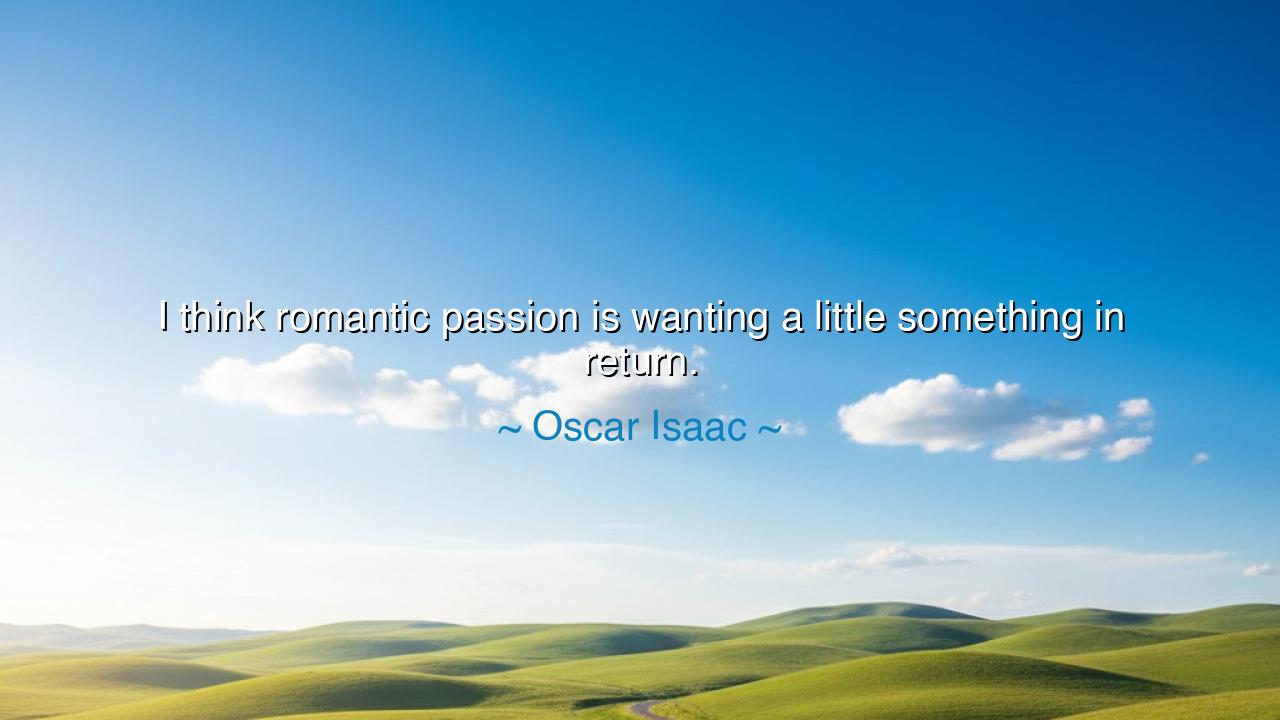
I think romantic passion is wanting a little something in return.






In the words of Oscar Isaac, spoken with both tenderness and insight: “I think romantic passion is wanting a little something in return.” These words cut to the core of human longing, for they reveal a truth both fragile and mighty—that love, though it begins as a gift freely given, yearns also for recognition, for reciprocity, for the echo that proves the heart’s fire is not burning alone. To love without return is noble, yet to feel passion is to hope, even quietly, for a response, a sign, a reflection of one’s own flame.
The ancients, who spoke in myth and carved wisdom into stone, understood this well. They told of Echo and Narcissus, of Pygmalion and Galatea, of lovers who yearned not only to give but to be received. Romantic passion is not content with silence—it desires to see its reflection in another’s eyes, to hear its song carried back across the canyon. This yearning is not weakness; it is the essence of passion itself. For passion is fire, and fire seeks to spread, to warm another, to ignite a shared blaze.
Consider the tale of Tristan and Isolde. Their love was fierce, tragic, and uncontainable, but it was never one-sided. Each glance, each touch, each sacrifice was met with something in return—even if it was only pain shared, even if destiny forbade their union. Their story teaches that passion thrives not in isolation but in the sacred exchange between souls. To desire this exchange is not greed but the natural law of love itself.
Even in the life of history’s great figures we see this truth unfold. Think of Frida Kahlo and Diego Rivera, two artists bound by passion as turbulent as the sea. Frida’s paintings bled with longing, pain, and devotion; Diego’s murals thundered with vision and power. Their bond was stormy, yet always alive, because each gave and each received—sometimes love, sometimes anguish, but never indifference. Theirs was a testament to Isaac’s words: passion does not survive in a vacuum, it survives when there is at least a little something reflected back.
The wisdom here is profound: to love passionately is not merely to pour oneself out endlessly, but to acknowledge the sacred need for mutuality. Without it, passion becomes despair, devotion becomes hollow, and the fire turns to ash. To long for something in return is to honor the dignity of one’s heart, to affirm that love is a dance, not a monologue. It is the difference between the candle that burns itself out alone and the torch that lights another, and together they illuminate the path ahead.
The lesson, then, is this: do not fear your desire for reciprocity. Do not let the world tell you that true love asks for nothing. Love is a gift, yes, but passion is an exchange. Be courageous enough to give openly, but also wise enough to seek and cherish the response—whether it comes as a word, a gesture, a touch, or a steadfast presence. For in these small returns lies the affirmation that your fire is seen, your song is heard, your love is alive.
Therefore, O listener, walk the path of love with both generosity and courage. Give freely, but do not diminish the worth of your own longing. Ask, and wait, for that little something in return—not out of selfishness, but out of reverence for the sacred balance of passion. For only in the echo of love do we know that we are not alone, and only in the return do we find that passion has fulfilled its promise.






AAdministratorAdministrator
Welcome, honored guests. Please leave a comment, we will respond soon